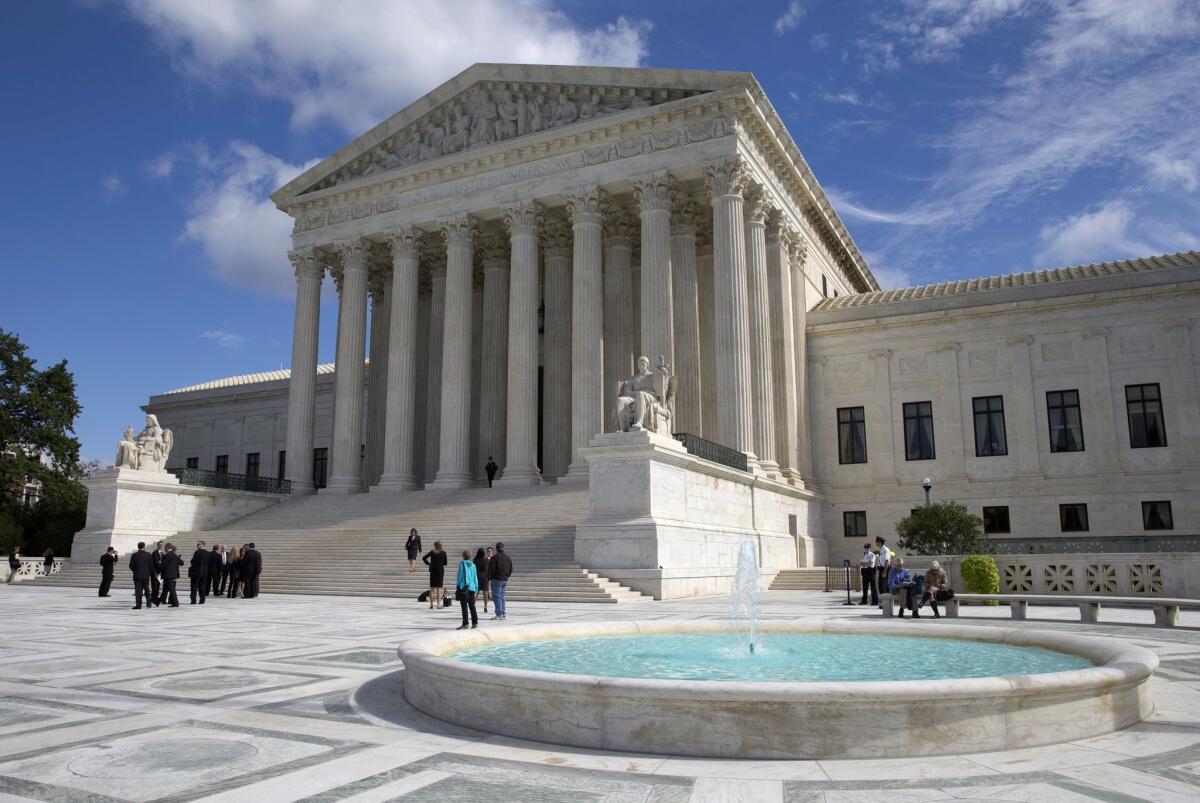Justices disagree in case involving DirecTV class-action lawsuit

The Supreme Court is starting a new term that promises a steady stream of divisive social issues, and also brighter prospects for conservatives who suffered more losses than usual in recent months.
- Share via
Reporting from Washington — The Supreme Court’s conservative justices have long been skeptical of class-action lawsuits that may be profitable for trial lawyers but can be costly to companies.
Judges in California have leaned the other way, fearing consumers and employees will be shortchanged if they cannot sue as a class.
This long-running East Coast-West Coast dispute resumed Tuesday when the high court heard DirecTV’s bid to block a class-action suit in Los Angeles over subscriber early cancellation fees.
It’s one of five class-action cases set to be decided in the Supreme Court’s new term, four of which come from California.
“It’s remarkable. We’ve never seen this much interest by the Supreme Court in class actions. And part of that is due to the resistance from the West Coast,” said Los Angeles lawyer Stephen J. Newman, who defends companies.
Consumer Watchdog, an advocacy group based in Santa Monica, brought the suit in 2008 on behalf of customers who alleged that they were wrongly charged up to $480 after they moved and no longer had access to the satellite service after the equipment stopped working.
But the real fight is over where this complaint will be resolved: in a private one-on-one arbitration or in a class-action claim in court.
Companies are determined to halt class actions. A disgruntled customer’s complaint involving no more than $1,000 can easily become a $5-million case if the lawyers say an additional 5,000 customers should join in.
SIGN UP for the free California Inc. business newsletter >>
Lawyers for DirecTV point to a series of recent Supreme Court rulings that say federal law stands behind contracts that call for individual arbitration of all disputes. In 2011, for example, the justices reversed the 9th Circuit Court and threw out a class-action claim filed in San Diego on behalf of cellphone customers who said AT&T Mobility overcharged each of them $30.22.
The justices sounded split Tuesday on whether to block the class-action suit against DirecTV. Justice Antonin Scalia said state judges should not be permitted to use “gimmicks” to get around arbitration clauses.
But Justice Stephen G. Breyer said contract law is decided by state judges, and in this case, a Superior Court judge and a state appeals court in Los Angeles decided that DirecTV’s contract from 2006 did not require arbitration. “Ultimately, this is a matter of state law,” Breyer said.
Scalia and Breyer have battled on this issue before. Three years ago, Scalia wrote the key opinion saying the Federal Arbitration Act trumped or preempted contrary state decisions in California.
In dissent in that case, Breyer said that would mean consumers could not bring small claims. “What rational lawyer would have signed on to represent [the consumers] for the possibility of fees stemming from a $30.22 claim?” he asked, speaking for the court’s four liberals.
Lawyers for DirecTV assumed Scalia’s opinion in AT&T vs. Concepcion would end the class-action suit. But the judges in Los Angeles said the contract referred to the “law in your state,” and, at the time, California law frowned on limits on class claims.
Last year, the California Supreme Court refused to hear DirecTV’s appeal, but in March, the U.S. Supreme Court said it would hear the case.
Harvey Rosenfield, the lawyer who founded Consumer Watchdog, said the fine print in a contract should not be read to prevent consumers from joining together in class-action claims, even in arbitration.
“The balance of power between big corporations and consumers depends on access to the courts,” he said in an interview. “You may have 800,000 people in a class with the same complaint, but obviously, no one person can take on a corporation in an arbitration.”
NEWSLETTER: Get the day’s top headlines from Times Editor Davan Maharaj >>
On the other side, lawyers for Horvitz & Levy in Encino joined with business groups in urging the justices to rein in the California courts again.
“California is out of sync with the rest of the country, and that can create problems for businesses which have offices throughout the country,” said John F. Querio, one of the lawyers who filed a friend-of-the-court brief supporting DirecTV. “Arbitration tends to be quicker and less expensive for the consumer, but a plaintiff’s lawyer will look to make it a class claim with tens of thousands of people because that’s where the real money is.”
In the month ahead, the Supreme Court will hear two cases in which major companies are trying new ideas to block class-action claims filed under federal law.
On Oct. 14, the court will consider whether a company can kill a class-action suit by offering to pay the lead plaintiff all of what he asked for. Jose Gomez, a California man, sued Navy contractor Campbell-Ewald alleging he received an unwanted text message, a violation of the Telephone Consumer Protection Act. The company offered him $1,503 to settle his claim, more than he sought, but the 9th Circuit Court said the class suit may proceed nonetheless.
On Nov. 2, the court will hear a closely watched case on whether websites can be sued for minor mistakes when reporting data. Thomas Robins sued Spokeo, a Pasadena-based website that provides personal but publicly available data on millions of people, alleging several errors in violation of the Fair Credit Reporting Act.
As with the Gomez suit, the Robins claim could expose the company to a huge number of identical claims. But Spokeo’s lawyers say his suit should be thrown out because he suffered no actual injury. The mistaken data portrayed him as wealthier and better educated than he is. The high court is urged to rule that such a lawsuit requires proof of actual harm to the plaintiff, not just a claim that a false fact was put online.
On Twitter: @DavidGSavage
ALSO
How Kevin McCarthy could lose the race for House speaker
Conservative GOP leader has unexpected Democratic fan: Michael Dukakis
Super PACs stretch the rules that prohibit coordination with presidential campaigns
More to Read
Sign up for Essential California
The most important California stories and recommendations in your inbox every morning.
You may occasionally receive promotional content from the Los Angeles Times.











